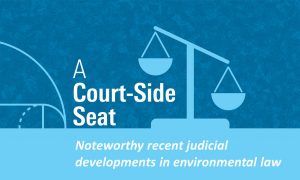Supreme Court’s Denial of Juno Therapeutics is Another Blow to the Life Science Patent Industry
“The Supreme Court’s denial of cert leaves in place a ruling that could make it more difficult for life science companies properly licensing pharmaceutical inventions to compete in the marketplace against sophisticated, well-resourced firms that are better positioned to win a race for market approval at the FDA.”
On November 7, the U.S. Supreme Court issued an order list showing that it had denied the petition for writ of certiorari filed in Juno Therapeutics, Inc. v. Kite Pharma, Inc. In denying the petition, the Court refused yet again to clarify the Federal Circuit’s questionable interpretation of U.S. patent code, this time within the context of the written description requirement of 35 U.S.C. § 112, and leaves in place an appellate court ruling that many believe will be very damaging to the United States’ life sciences innovation sector.
Federal Circuit Requires Disclosure of “Known and Unknown” Aspects of Invention
Juno filed its petition with the Supreme Court after the Federal Circuit’s ruling last August reversing a $1.2 billion jury verdict for Kite Pharma’s infringement of patent claims covering a cancer immunotherapy treatment. Although the jury’s finding of no Section 112 written description requirement issue was upheld by the Central District of California in a post-trial judgment as a matter of law (JMOL), the Federal Circuit agreed with Kite Pharma on appeal that Juno’s patent did not disclose the representative species or common structural features of a single-chain antibody variable fragment (scFv) used in the claimed chimeric antigen receptor (CAR) T-cell therapy, nor did it show that the inventors “possessed the entire scope of the claimed invention” of scFvs serving as binding elements in the immunotherapy treatment. The Federal Circuit dismissed Juno’s arguments that multiple scFvs for specific targets were well-known and long incorporated into CAR T-cell therapies, that the patent described scFv embodiments representative of all scFvs and that scFvs are interchangeable because they have a similar, common struction. The appellate court later denied a petition for en banc rehearing filed by Juno.
Several patent law commentators have taken umbrage with the Federal Circuit’s ruling in the case, finding it to be both damaging to U.S. innovation as well as unsupported by the language of Section 112. About a month after last year’s Federal Circuit ruling reversing the $1.2 billion jury verdict for Juno, IPWatchdog President and CEO Gene Quinn said that the Federal Circuit was employing a “ridiculous” written description standard that was nearly impossible for life sciences inventors to properly meet.
“As difficult as it is to believe, the Federal Circuit has actually said that inventors must convey both ‘known and unknown’ aspects of the invention in order to satisfy the written description requirement… But how can an inventor describe something that is unknown? And where does ‘possession’ come into play when that term and concept is not even mentioned in the statute?”
Chief Judge Michel, Cancer Research Amici All Backed Juno’s Petition for Writ
Paul Michel, Former Chief Judge of the Federal Circuit and a consultant with Juno Therapeutics during the Federal Circuit proceedings, also said that the Federal Circuit’s decision in Juno was “courting a disaster for American innovation.” Michel, who served as the top judge on the nation’s appellate court for patent matters from 2004 to 2010, argued that the Federal Circuit’s legal standard for Section 112’s written description requirement would require extensive and unnecessary testing just to show that Juno possessed “‘millions and billions’ of antibody fragments – a conventional, prior art component of the new therapeutic.” Not only does this drive Juno’s resources away from cancer research, it also greatly increases Section 112 validity risks for the entire life sciences sector.
“The Circuit Court has produced a legal regime that is unworkable, especially for biopharmaceutical inventions, where variability is the name of the game for just about any conventional component that might be used in a new medicine or other invention. I joined the underlying precedent, Ariad. But this new decision transforms Ariad’s flexible analysis that accounts for the science into an extremely rigid, legalistic, and harmful rule that ignores the science.”
Several amicus filings from research entities urged the U.S. Supreme Court to take up the case as a good vehicle for clarifying the proper written description standard under Section 112. City of Hope, a Comprehensive Cancer Center and research hospital, argued that the Federal Circuit’s requirement that inventors show possession of the invention’s full scope delays the public disclosure of the invention to conduct testing that adds no public benefit to the patent disclosure. St. Jude Children’s Research Hospital and several other cancer and medical research centers filed an amicus brief agreeing that the Federal Circuit’s possession requirement would exhaust their limited research resources. Should they pursue narrow patent protections “in which even well-established technology elements cannot be claimed generically,” St. Jude was concerned that copycats could evade infringement liability simply by using routine and conventional technologies.
“Amici rarely file amicus briefs in patent-related cases like this one, but they are compelled to do so here to underscore the threat this case poses to academic research… The CAR technology at issue in this case is emblematic of the valuable lifesaving research coming out of academic research institutions, whose further development efforts may be stymied by the decision below. This case is the perfect vehicle for this Court to address the Federal Circuit’s misguided, atextual approach and to clarify the written description requirement.” – Amicus Brief for St. Jude Children’s Research Hospital
Federal Circuit’s Legal Ruling Preserves $1.5 Billion Sales Forecast for Gilead’s Yescarta
While Juno Therapeutics and Kite Pharma may not be household names to most readers, the Federal Circuit’s ruling has had a much wider impact in the life sciences industry than many might expect. News coverage following Juno’s patent infringement suit has noted that the patent litigation campaign is between subsidiaries of two massive pharmaceutical firms: Juno Therapeutics is a division of Bristol Myers Squibb; and Kite Pharma, which developed an unlicensed version of Juno’s patented cancer immunotherapy, is owned by Gilead Sciences.
As of last December, Gilead predicted that lifetime sales of Yescarta, the CAR T-cell therapy targeted by Juno’s infringement allegations, would reach $1.5 billion. By contrast, Juno, which developed the CAR T-cell therapy Breyanzi after licensing the now-invalidated patent claims from Memorial Sloan Kettering Cancer Center, netted only $84 million in sales for the year following market approval by the U.S. Food and Drug Administration in 2021. The Supreme Court’s denial of cert leaves in place a ruling that could make it more difficult for life science companies properly licensing pharmaceutical inventions to compete in the marketplace against sophisticated, well-resourced firms that are better positioned to win a race for market approval at the FDA.
Steve Brachmann
Steve Brachmann is a graduate of the University at Buffalo School of Law, having earned his Juris Doctor in May 2022 and served as the President of the Intellectual Property […see more]







